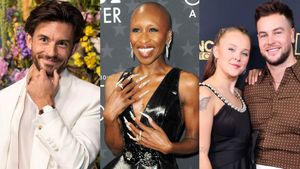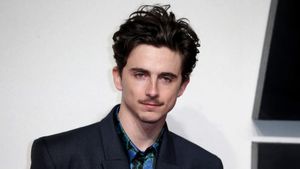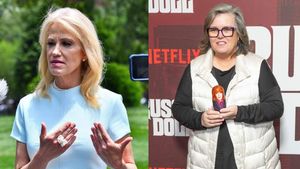For the first time ever, in 2020 queer women outnumbered queer men in films from major studios, according to a new report by GLAAD. The year also saw a growth in racial diversity and screen time for LGBTQ+ characters, but trans and nonbinary characters were completely absent for the fourth year in a row.
The findings are from GLAAD's ninth annual Studio Responsibility Index, which maps the quantity, quality, and diversity of LGBTQ+ characters represented in films released by major studios. The study, released Thursday, found that of the 44 films released by major studios in 2020, 10 (22.7 percent) featured LGBTQ+ characters, including Like a Boss, The Broken Hearts Gallery, Fantasy Island, Valley Girl, Freaky, The New Mutants, and Birds of Prey. This was up from 2019's 18.6 percent (22 out of 118 films), but there were still 12 fewer major releases with LGBTQ+ characters overall. The sharp decline in the number of films released last year was a direct result of COVID-19, which shut down theaters for a significant portion of 2020.
Last year saw 20 LGBTQ+ characters in major theatrical releases, which was down from 50 in 2019 -- again due to there being far fewer films released theatrically in 2020. Of the 20 characters who did make it to screen last year, 11 were women and nine were male, which marked the first time there were fewer male characters than female in the study's history.
While women may have seen more representation among LGBTQ+ characters in 2020, it marked the fourth year in a row where there were no transgender or nonbinary characters in any studio release. This prompted GLAAD to once again call for greater trans and nonbinary representation in film, particularly in light of the current political climate where anti-transgender legislation is proliferating across the nation.
On a positive note, 2020 saw an increase in racial diversity of LGBTQ+ characters in film. Of the 20 characters, 40 percent (eight characters) were people of color, which marked a 6 percent increase over 2019. While this is a positive trend, it's still 17 percentage points lower than in 2017, when a record 57 percent of LGBTQ+ characters were POC. According to the study, of last year's 20 LGBTQ+ characters, 11 (55 percent) were white, three (15 percent) were Asian-Pacific Islander, two (10 percent) were Black, two (10 percent) were Latinx, and one (5 percent) was Indigenous. One character (5 percent) was a non-human-appearing alien in Onward.
Where the major studio film industry does continue to fail, however, is in representing LGBTQ+ individuals living with HIV and those with disabilities. Both categories had zero representation in 2020. As a result, GLAAD is calling on the distributors tracked in this report to "urgently prioritize active development and theatrical release in coming years of stories featuring LGBTQ characters living with HIV." According to GLAAD's State of HIV Stigma survey in 2020, the group found that nearly nine out of 10 Americans believe "there is still stigma around HIV."
In past years, GLAAD has assigned grades to each studio based on the "Vito Russo Test," named for the late gay film historian, which assesses the quantity and diversity of LGBTQ+ representation in studio releases. This year, however, it chose to suspend that practice due to the impact of COVID-19 across the industry. Still, GLAAD notes that "90 percent of LGBTQ-inclusive films (nine of 10) released in 2020 passed the Vito Russo Test, which is the highest percentage recorded in the report's history, or 20 percent of 44 total films."
While 2020 was an unprecedented year in many ways, GLAAD President and CEO Sarah Kate Ellis also sees it as an opportunity for a reset and growth. "This is a critical time of transformation for Hollywood -- challenged to redefine business lines and practices during a global pandemic, driven by an increased demand from consumers hungry for new content, and rocked by the rightful reckoning and pressure for these studios to create more meaningful substantive change in representing and investing in marginalized communities," Ellis said. "This transformation represents a great opportunity to swiftly accelerate acceptance of LGBTQ stories, break new ground, and invest in queer and trans talent and stories that audiences are eager to watch. Hollywood and the business of storytelling must be more nimble, more creative, more open than ever before."
Not only is greater representation in film meaningful for LGBTQ+ people, but it's also just good business. "We know that LGBTQ audiences are a powerful and invested audience -- and a quickly growing one -- as we see more and more people empowered to live their authentic lives. The power, passion, and growth of LGBTQ audiences proves that if studios wish to be successful in retaining and expanding fans, they must tell meaningful queer and trans stories," said Megan Townsend, GLAAD's director of entertainment research and analysis. And as the industry turns increasingly to streaming services, it would be an error to overlook LGBTQ+ audience who not only drive the box office but are also heavy streaming users, Townsend explained. "As the industry looks towards a changing future, it is clear that LGBTQ characters need to be part of stories across all platforms of distribution, and prioritizing offering fan engagement experiences provides even greater opportunity for representation and inclusion," she said. "Sincerely engaging LGBTQ audiences can only benefit the studio's bottom lines."
Read the full report at GLAAD.org.




































































Charlie Kirk DID say stoning gay people was the 'perfect law' — and these other heinous quotes